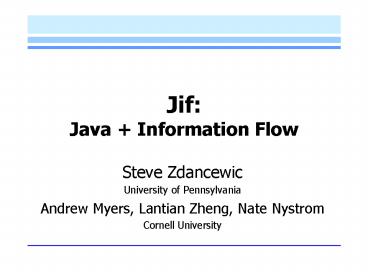Jif: Java Information Flow PowerPoint PPT Presentation
1 / 30
Title: Jif: Java Information Flow
1
Jif Java Information Flow
- Steve Zdancewic
- University of Pennsylvania
- Andrew Myers, Lantian Zheng, Nate Nystrom
- Cornell University
2
Confidential Data
- Networked information systems
- PCs store passwords, e-mail, finances,...
- Businesses build computing infrastructure
- Military government communications
- Security of data and infrastructure is critical
Trust in Cyberspace, Schneider et al.
'99
3
Technical Challenges
- Software is large and complex
- HotMail bugs read anyone's mail, steal passwords
- Security policies are complex
- Requires tools automation
- Existing mechanisms are crucial, but
- OS Coarse granularity of access control
- Cryptography must be applied appropriately
4
Jif JavaInformation Flow
Myers, Nystrom, Zdancewic, Zheng
- Java
- With some restrictions
- Information Flow Policy Language
- Principals and Labels
- Principal Hierarchy (delegation)
- Confidentiality Integrity constraints
- Robust Declassification Endorsement
- Language features (i.e. polymorphism)
5
Benefits
- Explicit, fine-grained policies
- Program abstractions
- Regulate end-to-end behavior
- Information Flow vs. Access Control
- Tools increased confidence in security
6
Information-flow Policy
- Downloadable financial planner
Disk
AccountingSoftware
- Access control insufficient
7
Noninterference
GoguenMeseguer '82,'84
Disk
AccountingSoftware
- Private data does not interfere with network
communication - Baseline confidentiality policy
8
Principals
- Principals users, groups, etc.
- Express constraints on data usage
- Distinct from hosts
- Alice, Bob, etc. are principals
- Jif runtime represents principals as Java classes
9
Decentralized Labels
Myers Liskov '97, '00
- Simple Component owner readers
- Alice Bob, Eve
- Compound Labels
- Alice Charles Bob Charles
Alice owns this data and she permits Bob Eve
to read it.
Alice Bob own this data but only Charles
can read it.
10
Label Lattice
T
Alice
Labels higher in the lattice are
morerestrictive.
AliceBob
?
AliceBob,Charles
Alice Bob,Eve
11
Integrity Constraints
- Specify who can write to a piece of data
- Alice? Bob
- Both kinds of constraints
- Alice Bob Alice?
Alice owns this data and she permits Bob to
change it.
12
Extended Types
- Jif augments Javas types with labels
- intAliceBob x
- ObjectL o
- Subtyping
- Inherited from the ? lattice order
- Inference
- All Jif expressions have labeled types
- Programmers may elide types
13
Implicit Flows
intAlice a intBob b ...
if (a gt 0) then b 4
Assignment leaks information contained in the
program counter.
14
Implicit Flows
intAlice a intBob b ...
if (a gt 0) then b 4
To assign to variable with label X, must have
PC ? X.
15
Function Calls
intAlice a intBob b ...
if (a gt 0) then f(4)
Effects inside the function can leak information
about the program counter.
16
Function Calls
intAlice a intBob b ...
if (a gt 0) then f(4)
To call a function with effects bounded by X
must have PC ? X.
17
Method Types
intL1 methodB (intL2 arg) E where
authority(Alice)
- Constrain begin and end PC labels
- To call PC ? B
- On return PC ? E
- May include where clauses to specify
- Authority (set of principals)
- Callers Authority
18
Richer Security Policies
- More complex policies
- "Alice will release her data to Bob, but only
after he has paid 10." - Noninterference too restrictive
- In practice programs do leak some information
- Justification lies outside the model (i.e.
cryptography)
19
Declassification
intAlice a int Paid ... // compute Paid
if (Paid10) intAliceBob b
declassify(a, AliceBob) ...
down-cast" intAlice to intAliceBob
20
Robust Declassification
Zdancewic Myers CSFW'01
intAlice a intAlice? Paid ... // compute
Paid if (Paid10) intAliceBob b
declassify(a, AliceBob) ...
Alice needs to trust the contents of paid.
Introduces constraint PC ? Alice?
21
First Class Labels Principals
- Two new primitive datatypes
- principal
- Can be bound to different users at run time
- Programmer can ask whether p actsfor q
- label
- A value that can be used as a dynamic tag
- If x is a label value then x is the type
- Can use switchlabel(l) to examine run-time labels
22
Parameterized Classes
- Jif allows classes to be parameterized by labels
and principals - Code reuse
- e.g. Containers parameterized by labels
- class MyClasslabel L intL x
23
Demo
24
Unix cat in Jif
public static void main(String args)
String filename args0 final
principal p Runtime.user() final label
lb lb new labelp Runtimep
runtime Runtime.getRuntime(p)
FileInputStreamlb fis runtime.openFileRead(fi
lename, lb) InputStreamReaderlb reader
new InputStreamReaderlb(fis)
BufferedReaderlb br new BufferedReaderlb(r
eader) PrintStreamlb out
runtime.out() String line
br.readLine() while (line ! null)
out.println(line) line
br.readLine()
25
Caveats
- No threads
- Information flow hard to control
- Active area of research (still preliminary)
- Timing channels not controlled
- Explicit choice for practicality
- See Agat 01 for alternatives
- Differences from Java
- Some exceptions are fatal
- Restricted access to some System calls
26
Language-based Security
- Denning 75, 77
- Smith Volpano 9601
- Abadi, Banerjee, Heintz, and Riecke 99
- Sabelfeld Sands
- Honda Yoshida 01, 02
- Pottier et al. 01, 02
27
Jif Project Status
- Complete implementation of Jif.
- Implemented several thousand LOC
- Mostly small test cases
- Port of Javas io package
- Hashtable implementation
- Tax simulation (300 LOC)
- Battleship program (300 LOC)
28
Ongoing Jif Research
- Using this programming model in distributed
settings
SOSP 01 - Replication of code data to improve integrity
guarantees submitted for
publication
29
Jif Project Home
www.cs.cornell.edu/jif
30
(No Transcript)

